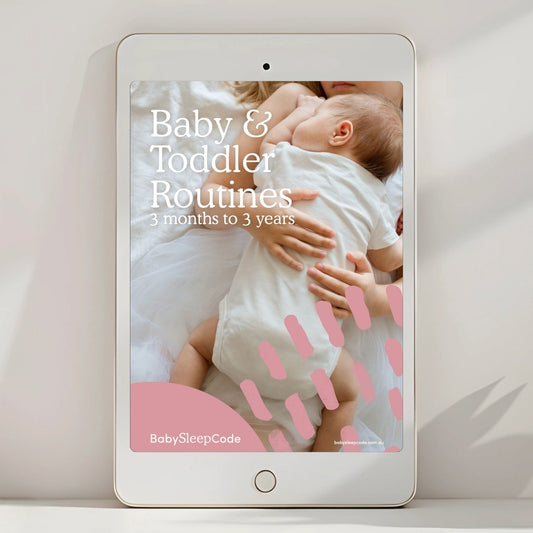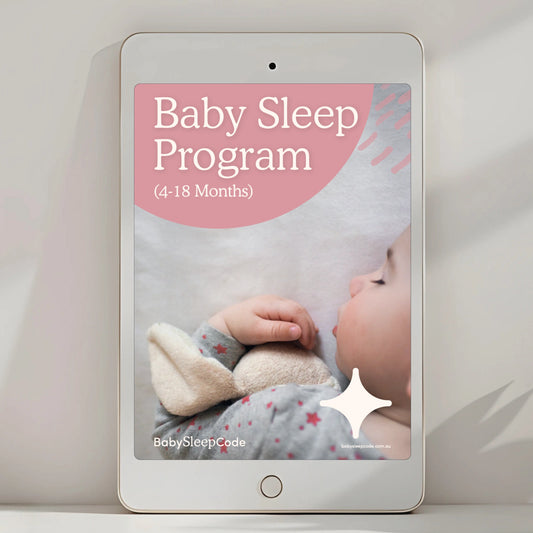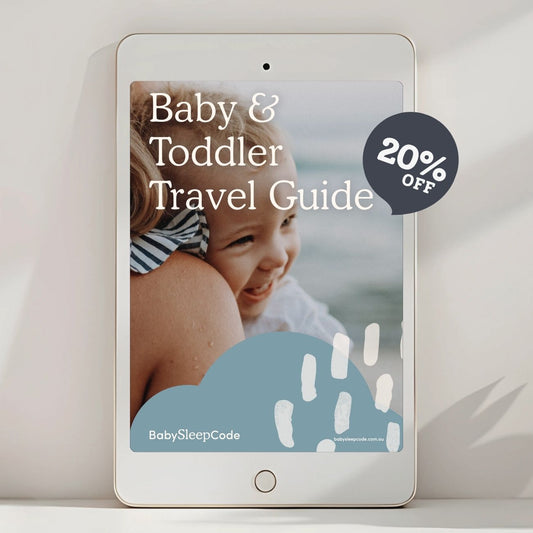Considering a trip overseas? Traveling with your little one may seem daunting especially when crossing time zones, but in our experience, babies and toddlers who sleep well at home can be great sleepers on holidays as well!
What is jet lag?
Jet lag describes the feelings we experience when we cross time zones and our circadian rhythm is thrown out of whack. Our circadian rhythm is our internal body clock which is set by external cues–such as light, food, and social interaction.
When we follow predictable routines and our internal clock is functioning well, it aids us in our daily activities by producing the right types of hormones at that right times. Producing alert hormones in the morning to help us wake up, digestive hormones when we typically eat meals, and sleep hormones at our typical bedtime.
This is why you experience hunger pangs around the same time each day, grow tired at the same time each day, and if you regularly set an alarm to wake you'll often find yourself waking minutes before it's set to go off. This is our circadian rhythm at work.
Now, suppose you travel to the other side of the world, and arrive in a completely new timezone. Your internal body clock will be totally confused! It's suddenly light when it's supposed to be dark, there's social activity or food when you're supposed to be asleep. So you experience jet lag: your body is producing sleep hormones in the middle of the day while you're trying to stay awake and alert hormones in the middle of the night. Your internal clock needs time to adjust to the new external cues.
Can babies get jet lagged?
Yes, but it's nothing you can't handle. They will just need a little help to adjust to the new time zone (just like you will).
So don't let baby sleep worries stop you from booking your trip.
How to manage your baby's jet lag
To get rid of your baby's jet lag quickly, you'll want to adapt to the new time zone as soon as you arrive.
If you arrive in the morning, encourage maximum light, regular feedings, and social activity: venture out of your hotel! Consider any baby sleep between 7 am and 7 pm a nap, and try not to let them sleep much more than they would normally during the day. Those rest periods are just opportunities to relieve a little sleep pressure and help your baby push through until bedtime. You don't want to completely reset that sleep pressure to zero-or night sleep will be a mess.
Also, sleep when your baby sleeps! You're on vacation and are jet lagged too. Your baby may intend to party all night, so rest when you have the chance.
If you arrive in the evening, try to get your baby down at their usual bedtime in the new time zone. If they're down to just one or two naps, keeping them awake for the last few hours of your travel time may make this easier. Also, maintain your regular bedtime routine as best you can so they're more likely to settle well (bath/shower, pyjamas, a bedtime story, cuddles, a lullaby, etc.). Use all the sleep associations you use at home to make them feel comfortable in their new environment (read more about managing sleep while on holiday here).
It's okay if your baby goes down for the night earlier than usual. Just do your best to get to a semi-reasonable bedtime without overtiring them. Keep in mind that if they crash at 5 pm, they'll probably be awake by 5 am the following day. So be ready!
Overnight wakes
Your baby will likely wake up overnight at first. Keep these wakes as low-key as possible: maintain dim lights, speak softly, and avoid play. If your baby doesn't usually feed overnight, try to keep night feeds to a minimum.
If your baby wakes in the middle of the night and is happy in the cot, leave them to it! On the other hand, if they are wide awake and want out, don't drive yourself crazy trying to resettle them. Getting them up briefly will allow sleep pressure to rebuild. Then, watch for tired signs and pop them back into their cot to fall asleep.
During the day
Remember, our circadian rhythm is set by light, food and social interaction. So to help your baby adjust as quickly as possible-get outside often or keep the curtains wide open; offer regular feedings and meals (they won't be as hungry as usual so don't be alarmed if their appetite seems low at first); and keep your days socially active.
How long will my baby's jet lag last?
In general, for every hour of a time change it may take the same number of days for the body to adapt. So, if you're traveling with a 10-hour time difference, your internal body clock can take 10 days to fully adjust.
In our experience though, babies who are still napping can adjust much faster than this, especially if you follow the tips outlined above. Within a few days, your baby's schedule should return to normal, with naps and bedtime becoming more predictable.
Be confident. Grab our international travel guide!
Our downloadable Baby & Toddler Travel Guide is the ultimate resource to ensure your little one gets the rest they need while you create amazing memories together.
Read on your phone or print out. This comprehensive guide includes baby & toddler packing lists, tips on flying & driving with a baby, managing sleep in unfamiliar places, handling time zone changes and travel days, avoiding major regressions and so much more.
Grab the Baby & Toddler Travel Guide.










